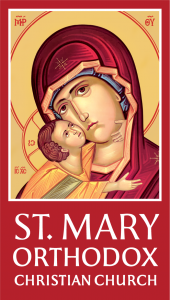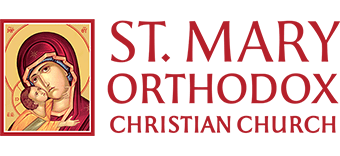The Orthodox Spirit and the Nativity Fast
/in Articles, Orthodox Articles/by St. MaryBy Metropolitan Saba (Isper)
Saint Porphyrios of Kafsokalyvia (also known as Saint Porphyrios the Seer, +1991) recounts, in the context of narrating events from his life, his experience as a spiritual father with the sacrament of confession. He was a mere fourteen years old when he fled to Mount Athos. There, he lived in the company of two hermits who were brothers according to the flesh. His illness compelled these hermits to send him down from the sacred mountain in search of medical treatment and recovery. Upon returning to his village and regaining his health, the metropolitan of the archdiocese ordained him a priest and granted him the blessing to be a father confessor, all while he was a young man of just twenty-two years, and he only knew the spiritual direction of ascetic monastic life.
In reflecting on that experience, he mentioned that he kept the book of Saint Nicodemus of Athos by his side. This book, rooted in the realities of the 16th and 17th centuries, meticulously cataloged sins one by one and established rules for repentance and discipline for each sin. The canons contained within this book may seem excessively stringent to the modern person.
Saint Porphyrios’ unwavering commitment to his faith and his monastic education compelled him to consult this book after every confession. He would assign penitents a regimen that corresponded to their particular sin: three hundred prostrations daily, weeks or months of fasting, and so forth. However, he soon realized that these rules exceeded the capacities of the faithful and did not contribute to their spiritual growth. On the contrary, they led to a sense of despair regarding the possibility of overcoming their sins, and this despair often caused them to return to their sins.
He thus made the decision to close the book and place it on the shelf. Instead, he began to inquire of the penitents regarding the number of prostrations they could reasonably perform and the duration of fasting they could sustain, providing them with an obedience tailored to their abilities.
The example of Saint Porphyrios teaches us the distinction between the spiritual teachings of the Church and their practical application. Spiritual growth is a gradual process in which believers ascend toward their desired spiritual state. The Church’s role is to provide personal support and guidance to individuals on their spiritual journeys, helping them climb the ladder of salvation. Pastors or spiritual fathers draw from living spiritual experiences, not just static texts, to offer spiritual care that considers the individual’s capacity, readiness, and circumstances.
Father confessors accompany the faithful on their spiritual path and tailor their guidance to the unique needs of their spiritual children, focusing on what is most beneficial for their growth in Christ. The Gospel serves as a general spiritual guideline, but the specific application and embodiment of the Gospel’s teachings depend on the spiritual father’s experience and the individual believer’s abilities, circumstances, and state of being. This principle forms the foundation of Orthodox spiritual guidance.
A story from The Garden of Monks (The Paradise of the Desert Fathers) illustrates this concept. It tells of a young man from a wealthy family who sought monastic life in an Egyptian desert monastery. The monks of the monastery slept on the ground, following the customs of their time. However, the abbot granted the young man the privilege of using a pillow while sleeping. Some of the other monks saw this as special treatment and complained. The abbot responded by saying, “My sons, you used to sleep on the ground in your homes, and when you came to the monastery, your sleeping conditions did not change much. But he used to sleep on a bed with a pillow of ostrich feathers. Whose monastic sacrifice is greater?”
This incident, along with countless others in our spiritual heritage, emphasizes the importance of tailoring guidance to each person’s abilities, circumstances, and potential to help them progress to higher levels of spiritual growth. As the Apostle Paul says, “When I was a child, I spoke as a child, I understood as a child, I thought as a child; but when I became a man, I put away childish things” (1 Cor. 13:11).
“The letter kills, but the Spirit gives life” (2 Cor. 3:6) yet going beyond the letter and reaching the Spirit requires deep spiritual experience and profound humility, which enables pastors to be receptive to the experiences of those more spiritually advanced and benefit from them. Often, stubbornness and excessive rigor are rooted in hidden passions such as self-righteousness or vainglory. History has witnessed the downfall of many who, in their strictness, stifled and overwhelmed those under their guidance.
Our Orthodox spiritual heritage teaches us to be rigorous in self-discipline while being compassionate and merciful towards others. This message is especially relevant since some priests considering abstinence from oil as a central aspect of the Nativity Fast. The Nativity Fast in the Orthodox Church is observed as follows:
– Abstention from food and drink until noon is not required.
– Fish and seafood are allowed until December 12, which coincides with the feast of Saint Spyridon the Wonderworker.
– The strictness of fasting increases as Christmas approaches.
Abstaining from oil is a monastic tradition blessed for those who desire it, with the blessing of their spiritual father, but it is not obligatory. Some individuals justify abstaining from oil based on references in the Great Horologion. The Church’s response is that the influence of monastic practices became more widespread with the growth of the monastic movement and the guidance provided by monastic fathers. Our liturgical books were formulated under this monastic influence. The Church does not prohibit these practices, but it does not impose them on everyone. Thus, such practices remain optional and contingent upon the willingness of the believer to live a more ascetic life, guided by a spiritual father who understands their potential and spiritual condition. It is crucial to be aware of the potential pitfalls associated with what our heritage refers to as the “devil of excessive zeal.”
The spiritual father’s role is to accompany his spiritual children, nurturing their spiritual growth and development, rather than burdening them with practices that exceed their capacity and lead to despair, ultimately causing them to abandon the Christian path leading to salvation. The arrangements within our Church order (the Typikon) are designed to help believers engage with and experience the salvific events they commemorate. These arrangements aim to facilitate spiritual growth, purity, and holiness rather than serve as additional burdens. In the words of Jesus, “The Sabbath was made for man, not man for the Sabbath” (Mark 2:27).
Johnny’s Story: “I Want to Be a Member of God’s Church”
/in Orthodox Articles, Weekly News/by St. MaryBeloved in Christ,
I want to pass along to you a short video I received from Orthodox Christian Prison Ministry (OCPM). It is a powerful testament to the work OCPM is doing on our behalf. I hope you will take a few minutes to hear about Johnny’s story.
Yours in Christ,
Fr Aaron
From Nicholas Petrogeorge, Executive Director of OCPM:
Johnny’s testimony is such a powerful example of what Christ is doing in prison through your support. Please enjoy the video and share with anyone you know who needs encouragement!
Johnny is now a member of the Matthew 25:36 Fellowship, OCPM’s community of monthly donors, providing those in prison with the same opportunity he was given for a relationship with the Church.
Statements from the Assembly of Bishops
/in Orthodox Articles/by St. MaryBeloved in Christ,
As mentioned in my homily last week, I want to provide you with two important documents/statements made recently by the Assembly of Bishops.
The first is a comprehensive statement of the Orthodox Church’s regard for human life and, in particular, the termination of human life. It speaks to multiple situations and scenarios, including the death penalty. You can find it here.
The second is a statement specific to the recent overturning of Roe v. Wade. It can be found here.
I hope you find both of these statements to be valuable. Feel free to contact me with any questions or concerns.
Yours in Christ,
Fr Aaron
Fr Aaron on Wellness in Time of Crisis
/0 Comments/in Orthodox Articles, Weekly News/by St. MaryBeloved in Christ,
Yesterday I appeared on a show called “Wellness in Time of Crisis” to discuss faith and spirituality in time of crisis, with a specific focus at times on the current crisis/civil war in Ethiopia. If you would like to view the show, it is available on YouTube (see the link below).
Please pray for all of those in Ethiopia suffering as a result of these tragic circumstances.
Yours in Christ,
Fr Aaron
How to Form an Orthodox Conscience
/0 Comments/in Orthodox Articles/by St. Maryby Father Alexey Young
(Originally published by Orthodox America, presented here and edited slightly for space by Father Peter Smith)
An Orthodox Christian conscience is created by the grace of our Lord Jesus Christ acting within us. It is difficult to form this conscience. But once a Christian acquires it, an alarm is sounded in his heart and mind whenever he comes close to improper actions, lack of charity toward others, false ideas, and deviations from the holy traditions of Orthodoxy. Read more
How Everyone Should Prepare Before Confession
/0 Comments/in Orthodox Articles/by St. MaryAn Excerpt from Exomologetarion (A Manual of Confession)
by St. Nikodemos the Hagiorite Read more
A Thanksgiving Prayer by Father Alexander Schmemann
/0 Comments/in Orthodox Articles/by St. Mary(offered following the Divine Liturgy offered on Thanksgiving Day 1983)
Everyone capable of thanksgiving is capable of salvation and eternal joy. Read more
What is a Catechumen?
/0 Comments/in Orthodox Articles/by St. MaryInterested in learning how to become Orthodox? Take a look at the article here where we look at “What is a Catechumen?” Your next step is to contact the Very Rev. Father Aaron Warwick at St. Mary to discuss more. Read more
Online Orthodox Catechism
/0 Comments/in Orthodox Articles/by St. MaryLooking to learn more about Orthodoxy? Or would you like to dig deeper into your faith. Check out these links for online Orthodox catechism. Then, please contact us today or come visit us at Divine Liturgy at 10 am!
Online Sources: Orthodox Catechism
You’ll find several resources online.

Info
Service Times
Sunday: 9 am – Matins
Sunday: 10 am – Divine Liturgy
Saturday: 4:30 pm – Confessions
Saturday: 5 pm – Great Vespers
